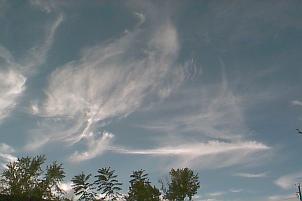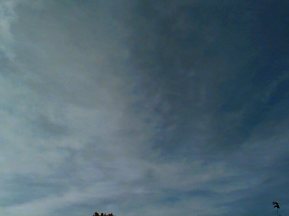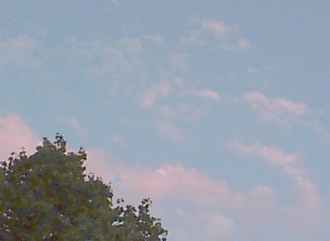CloudsClouds form by the condensation of water into extremely small droplets of liquid or ice. Clouds are classified according to the height at which they form and their structure. High clouds form above 7,000 m (23,000 ft) and are primarily composed of ice crystals. Meteorologists call these cirro-form clouds. Mid-level clouds form between 2,000 and 7,000 m. The prefix alto is applied to these clouds. Low clouds form between the surface and 2,000 m. Clouds are also classfied based on their form or structure. If they take on a layered appearance they are strati-form. If they show vertical development they are cumulo-form. To indicate they are precipitating, meteorologists apply the prefix nimbo or suffix nimbus to their name. There are many other terms used to describe cloud form but they are beyond the scope of this textbook. High cloudsHigh clouds are cirro-form clouds being composed mostly of ice. Generally found above 7,000 meters, these clouds include: cirrus, cirrostratus and cirrocumulus.
Cirrus clouds appear as wispy thin veils or detached filaments composed mostly of ice. Strong winds aloft often create the fibrous ice trails which tend to curl at their ends. Cirrus clouds with hooked filaments are sometimes called "mare's tails". Cirrus clouds are associated with an approaching warm front.
Cirrostratus is a transparent, whitish veil of cloud that usually covers much of the sky. Sometimes cirrostratus clouds are so transparent that you can barely see them. They often create a halo around the sun or moon. Cirrostratus clouds thicken and grade into altostratus clouds with the approach of a warm front.
Cirrocumulus clouds appear as white patches made up of very small cells or ripples. The globules of cloud are arranged in a regular pattern and are commonly called "mackerel sky" for their similarity to the scales of a fish.
|
 Figure 7.18 Cirrus clouds
Figure 7.18 Cirrus clouds Figure 7.19 Cirrostratus Cloud
Figure 7.19 Cirrostratus Cloud Figure 7.20 Cirrocumulus Clouds
Figure 7.20 Cirrocumulus Clouds 